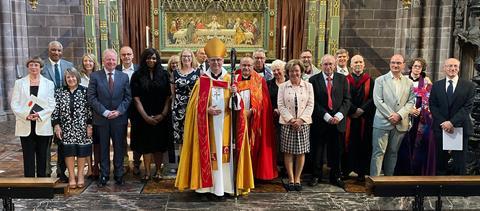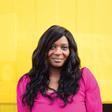No job is entirely secular. And even those employed in Christian ministry should be engaging with the outside world, says Chine McDonald

This summer, I was installed as a canon theologian at Chester Cathedral (pictured, above). These honorary roles sit at the intersection between a cathedral and the academy, between the Church and public life, between the sacred and the secular. There has been a worshipping community on the site in Chester for 2,000 years; and with that comes all the ceremony and ritual that has been honed over many centuries.
During the service I was shown to what is now my official seat – the wood-framed throne named after the 17th-century poet George Herbert. As I later stood in front of the stained-glass window depicting Herbert, I felt an affinity with him – this politician and priest, who spent much of his life wrestling with the question of what God was calling him to – was it to the Church or the world?
This month, as many young Christians begin university courses that will likely influence their future career paths, I want them to know that the answer to the question of ‘the Church or the world?’ is ‘both’. I don’t believe any job is entirely secular, and I believe those who are called to sacred jobs in ministry are also called to engage in the secular world.
George Herbert spent a significant amount of his life in academia, becoming the public orator at Cambridge University before going into politics. A seemingly secular role – but he described his experience of it as being “joined with heaven”. Even after becoming a priest, he advised other clergy to see everyday things – ploughs, leaven and dances – as being made to “serve for lights even of Heavenly Truths”.
God is in all things, holding all things together
For him, the line between the sacred and the secular was permeable – not least when it came to vocation. I love that we know that Jesus, our saviour, also had a trade and worked as a carpenter.
During the Olympics I was struck by the sense of calling many athletes said they had experienced; people doing what they feel they were made for. For some, this sense was borne out of their deep Christian faith. In Paris a century ago, Scottish sprinter Eric Liddell – of Chariots of Fire fame – won gold in the 400 metres, and famously said: “God made me fast. And when I run, I feel His pleasure.” Ahead of the Games, Team GB swimmer Adam Peaty spoke too about finding meaning in the Christian faith, and a sense of home in church. After winning his silver medal in the 100m breaststroke final, he spoke poignantly about his calling. “It’s broken me, this sport,” he said, “but it’s given me life and everything I am.” In the run-up to the Paralympics, wheelchair racer Karé Adenegan told this magazine: “In the past I questioned my disability, questioned God and questioned my purpose. But I recall being on the track and having a sense of: Wow, God, you’re with me, and you brought me here.”
I’m convinced there is no need to draw lines between roles and spheres considered sacred and those thought of as secular. Just like Herbert, Liddell, Peaty and Adenegan recognise, I don’t think it’s possible to compartmentalise our lives and our societies so easily. God is in all things, holding all things together (Colossians 1:17).
For me, the beauty of my faith is that it doesn’t ask me to make these distinctions. I’m drawn to a picture of humans as wonderfully complex – heads and hearts and hands; the transcendent, the spiritual and the utterly mundane.
I find that it is sometimes in the most simple and straightforward things, in our sacred callings, and in our everyday work, that we can find glimpses of God.






































No comments yet